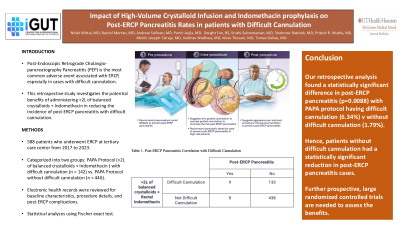Sunday Poster Session
Category: Interventional Endoscopy
P1046 - Impact of High-Volume Crystalloid Infusion and Indomethacin Prophylaxis on Post-ERCP Pancreatitis Rates in Patients With Difficult Cannulation
Sunday, October 27, 2024
3:30 PM - 7:00 PM ET
Location: Exhibit Hall E

Has Audio

Rachel Mortan, MD
University of Texas Health, McGovern Medical School
Houston, TX
Presenting Author(s)
Nitish Mittal, MD1, Rachel Mortan, MD1, Parvir Aujla, MD1, Andrew Sullivan, MD2, Dwight Fan, MD1, Sruthi Kapliyil. Subramanian, MD, FACG1, Abdullah S. Aleem, MD3, Veda Kulkarni, BS1, Mairin Joseph-Talreja, MD, FACG1, Srinivas Ramireddy, MD, FACG1, Pritesh R. Mutha, MD, FACG1, Vaibhav Wadhwa, MD, FACG1, Nirav Thosani, MD4, Roy T. DaVee, MD, FACG1
1University of Texas Health, McGovern Medical School, Houston, TX; 2University of Texas Health Science Center, Houston, TX; 3University of Texas at Houston, Houston, TX; 4McGovern Medical School at UTHealth, Houston, TX
Introduction: Post-Endoscopic Retrograde Cholangiopancreatography Pancreatitis (PEP) is the most common adverse event associated with Endoscopic Retrograde Cholangiopancreatography (ERCP), occurring in approximately 8% of all ERCPs and resulting in an annual estimated cost exceeding 150 million dollars in the United States. Post-Endoscopic Retrograde Cholangiopancreatography (ERCP) pancreatitis poses a substantial risk, particularly in cases involving difficult cannulation. This retrospective study investigates the potential benefits of administering greater than 2 liters of balanced crystalloids, combined with indomethacin, in reducing the incidence of post-ERCP pancreatitis and other complications in patients with difficult cannulation.
Methods: A retrospective cohort study was conducted, involving 588 patients who underwent ERCP at a multi-center institution from 2017 to 2023. Patients were categorized into two groups: those who received a high volume ( >2 liters) of balanced crystalloids and indomethacin with difficult cannulation (n=142), and those who did not had difficult cannulation (n=446). Electronic health records were reviewed for baseline characteristics, procedural details, and post-ERCP complications, with a specific focus on pancreatitis. Statistical analyses were employed using the Fisher exact test.
Results: Both groups have similar demographics and indications for ERCP. The group with >2L of balanced crystalloids and indomethacin with difficult cannulation had PEP of 6.34%, whereas patients without difficult cannulation had PEP of 1.79%. The findings revealed a statistically significant reduction in the incidence of post-ERCP pancreatitis in patients without difficult cannulation as compared to patients with difficult cannulation (p = 0.0088).
Discussion: This retrospective analysis revealed that patients without difficult cannulation had a statistically significant reduction in post-ERCP pancreatitis cases. Patients receiving rectal indomethacin and ≥ 2L of balanced crystalloids per American Society for Gastrointestinal Endoscopy (ASGE) guidelines for post-ERCP pancreatitis prevention strategies played a vital role to reduce the number of pancreatitis cases. This may be secondary to providers recognizing patients with higher-risk of developing PEP and more likely treating them peri procedurally with rectal indomethacin and balanced crystalloids. Further prospective, large randomized controlled trials are needed to assess the benefits.
Note: The table for this abstract can be viewed in the ePoster Gallery section of the ACG 2024 ePoster Site or in The American Journal of Gastroenterology's abstract supplement issue, both of which will be available starting October 27, 2024.
Disclosures:
Nitish Mittal, MD1, Rachel Mortan, MD1, Parvir Aujla, MD1, Andrew Sullivan, MD2, Dwight Fan, MD1, Sruthi Kapliyil. Subramanian, MD, FACG1, Abdullah S. Aleem, MD3, Veda Kulkarni, BS1, Mairin Joseph-Talreja, MD, FACG1, Srinivas Ramireddy, MD, FACG1, Pritesh R. Mutha, MD, FACG1, Vaibhav Wadhwa, MD, FACG1, Nirav Thosani, MD4, Roy T. DaVee, MD, FACG1. P1046 - Impact of High-Volume Crystalloid Infusion and Indomethacin Prophylaxis on Post-ERCP Pancreatitis Rates in Patients With Difficult Cannulation, ACG 2024 Annual Scientific Meeting Abstracts. Philadelphia, PA: American College of Gastroenterology.
1University of Texas Health, McGovern Medical School, Houston, TX; 2University of Texas Health Science Center, Houston, TX; 3University of Texas at Houston, Houston, TX; 4McGovern Medical School at UTHealth, Houston, TX
Introduction: Post-Endoscopic Retrograde Cholangiopancreatography Pancreatitis (PEP) is the most common adverse event associated with Endoscopic Retrograde Cholangiopancreatography (ERCP), occurring in approximately 8% of all ERCPs and resulting in an annual estimated cost exceeding 150 million dollars in the United States. Post-Endoscopic Retrograde Cholangiopancreatography (ERCP) pancreatitis poses a substantial risk, particularly in cases involving difficult cannulation. This retrospective study investigates the potential benefits of administering greater than 2 liters of balanced crystalloids, combined with indomethacin, in reducing the incidence of post-ERCP pancreatitis and other complications in patients with difficult cannulation.
Methods: A retrospective cohort study was conducted, involving 588 patients who underwent ERCP at a multi-center institution from 2017 to 2023. Patients were categorized into two groups: those who received a high volume ( >2 liters) of balanced crystalloids and indomethacin with difficult cannulation (n=142), and those who did not had difficult cannulation (n=446). Electronic health records were reviewed for baseline characteristics, procedural details, and post-ERCP complications, with a specific focus on pancreatitis. Statistical analyses were employed using the Fisher exact test.
Results: Both groups have similar demographics and indications for ERCP. The group with >2L of balanced crystalloids and indomethacin with difficult cannulation had PEP of 6.34%, whereas patients without difficult cannulation had PEP of 1.79%. The findings revealed a statistically significant reduction in the incidence of post-ERCP pancreatitis in patients without difficult cannulation as compared to patients with difficult cannulation (p = 0.0088).
Discussion: This retrospective analysis revealed that patients without difficult cannulation had a statistically significant reduction in post-ERCP pancreatitis cases. Patients receiving rectal indomethacin and ≥ 2L of balanced crystalloids per American Society for Gastrointestinal Endoscopy (ASGE) guidelines for post-ERCP pancreatitis prevention strategies played a vital role to reduce the number of pancreatitis cases. This may be secondary to providers recognizing patients with higher-risk of developing PEP and more likely treating them peri procedurally with rectal indomethacin and balanced crystalloids. Further prospective, large randomized controlled trials are needed to assess the benefits.
Note: The table for this abstract can be viewed in the ePoster Gallery section of the ACG 2024 ePoster Site or in The American Journal of Gastroenterology's abstract supplement issue, both of which will be available starting October 27, 2024.
Disclosures:
Nitish Mittal indicated no relevant financial relationships.
Rachel Mortan indicated no relevant financial relationships.
Parvir Aujla indicated no relevant financial relationships.
Andrew Sullivan indicated no relevant financial relationships.
Dwight Fan indicated no relevant financial relationships.
Sruthi Subramanian indicated no relevant financial relationships.
Abdullah Aleem indicated no relevant financial relationships.
Veda Kulkarni indicated no relevant financial relationships.
Mairin Joseph-Talreja indicated no relevant financial relationships.
Srinivas Ramireddy indicated no relevant financial relationships.
Pritesh Mutha indicated no relevant financial relationships.
Vaibhav Wadhwa indicated no relevant financial relationships.
Nirav Thosani indicated no relevant financial relationships.
Roy DaVee indicated no relevant financial relationships.
Nitish Mittal, MD1, Rachel Mortan, MD1, Parvir Aujla, MD1, Andrew Sullivan, MD2, Dwight Fan, MD1, Sruthi Kapliyil. Subramanian, MD, FACG1, Abdullah S. Aleem, MD3, Veda Kulkarni, BS1, Mairin Joseph-Talreja, MD, FACG1, Srinivas Ramireddy, MD, FACG1, Pritesh R. Mutha, MD, FACG1, Vaibhav Wadhwa, MD, FACG1, Nirav Thosani, MD4, Roy T. DaVee, MD, FACG1. P1046 - Impact of High-Volume Crystalloid Infusion and Indomethacin Prophylaxis on Post-ERCP Pancreatitis Rates in Patients With Difficult Cannulation, ACG 2024 Annual Scientific Meeting Abstracts. Philadelphia, PA: American College of Gastroenterology.
